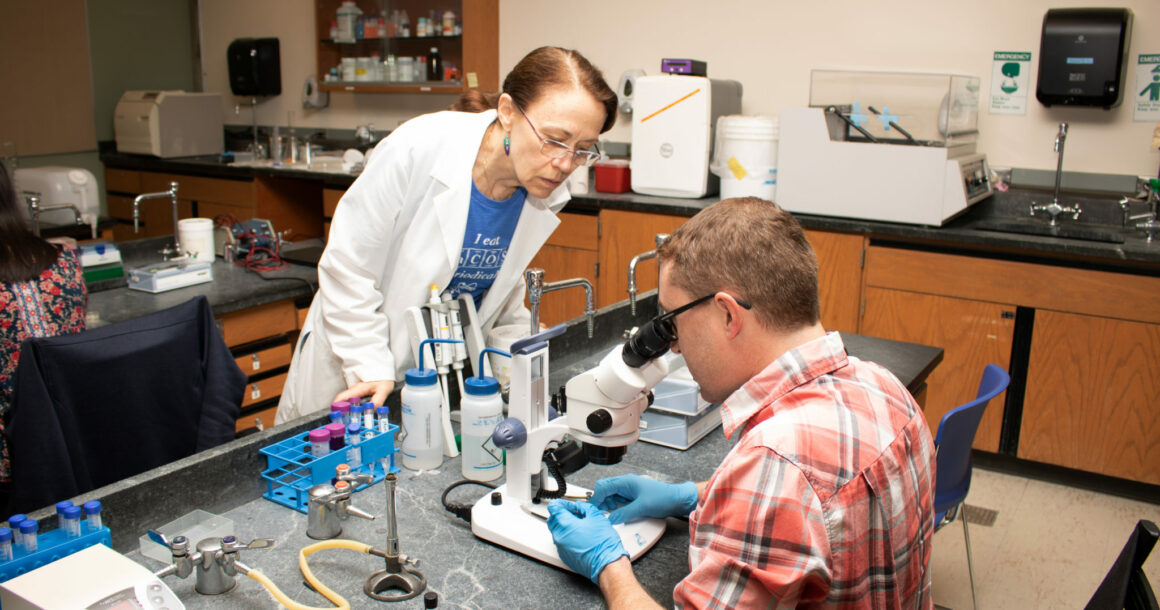Studying Small Worms Produces Big Results
Oct 25, 2019In 2013 the state of Washington estimated that there were 25,000 unfilled jobs because of a lack of qualified candidates, and 80% of those jobs were in the health care and STEM fields. Bellevue College stepped up to the plate and began the Bachelor of Applied Science in Molecular Biosciences program, which saw its second…

In 2013 the state of Washington estimated that there were 25,000 unfilled jobs because of a lack of qualified candidates, and 80% of those jobs were in the health care and STEM fields. Bellevue College stepped up to the plate and began the Bachelor of Applied Science in Molecular Biosciences program, which saw its second graduating class last spring.
The program integrates hands-on lab experiences throughout the curriculum and culminates in a 3-quarter Capstone project in which students have an opportunity to devise their own research question using the genetic model organism, C.elegans. This tiny worm is a popular test subject in the field of genetics because it is easily cultivated, translucent, and shares many pathways and processes with humans. MBS students are engaged in a number of projects, either here in the lab at Bellevue College or at UW, focusing on the mechanism of various neurodegenerative diseases, including Alzheimer’s disease, ALS, and Parkinson’s. The students find genes that have a clear homolog in humans and introduce mutations to investigate the effect on disease progression. Jacqueline Drak, a BC chemistry professor and the chair of the program, said the new lab sets the program apart: “Students have access to a lot of technology that other schools would not have available to undergraduates.”
One of the first graduates of the program, Katie Gill, said that she saw real results in genes affecting common diseases such as Alzheimer’s and Parkinson’s, including extended life spans of up to three days (a big deal for the little worms). “They tell you in science that you have to be prepared to fail, and try to figure out what went wrong, and try again,” she stated. “The coolest part was seeing something actually work.”
Gill also got to work on a robot developed at UW that is informally called the WormBot, which took pictures of the developing worms every 20 minutes for a month. These images were what the students used to evaluate the efficacy of the changes they had made.
In addition to the cutting-edge research, students get the guidance they need to build research skills for their future careers. “I think one of the key elements of the program is the small class size compared to other institutions,” Dr. Drak said. “This allows us to know our students very well and to give them one-on-one attention.” All Capstone students meet weekly with their research mentor, Dr. Jacqueline Miller, a faculty member in the program, and receive one-on-one guidance and help with troubleshooting.
The program has developed ties with local universities to help graduates continue their studies, if they wish. For instance, Northeastern University in Seattle saves two seats for BC graduates in their 1-year master’s program in biotechnology, which is a good degree for working in a forensics lab or as a genetic counselor. Some graduating students have gone right into the workforce at local companies such as such as Blue Heron, Intellectual Ventures, Aptevo Therapeutics and Seattle Genetics. Gill is interning at UW to get a certification that will allow her to be a clinical research associate. She was originally a nursing student at BC, and is very happy she made the change.
“In terms of learning I would give the program a 10/10: being in a lab, having a deadline, and making sure everything is working,” she said. “I’m thankful for the hands on experience that I’m not sure would be available in other programs.”
